新概念英语第一册L83单词
新概念第一册L83

cut cut cut read read read shut shut shut come came come
put put put set set set do did done give gave given
swim swam swum eat ate eaten
rise rose risen speak spoke spoken
take took taken go went gone
see saw seen
!
1) He
:for 和since 所引导的时间状语都表
示一段时间. 对划线部分提问都用 How long .
对下列划线部分进行提问。
has been away since last week .
Where there is life there is hope.
留得青山在,不怕没柴烧
•Free talk about holiday. Where did you go? Which place did you like best?
Lesson 83 Going on holiday
New Word and expressions
2)
一段时间的表达方法有 两 种: For : + 一段时间 for a year weeks for three years for two
Since :过去的某一时刻, since nine since last week
一般过去时态的时间状语从句, since you came. since you got home.
This
We can
did you
新概念英语第一册Lesson83-84

4.have a holiday 度假
have在不同的词组中,意思不同。 如have lunch,吃午饭。Have a cup of coffee,喝杯咖啡。
5.stay at home 呆在家里
注意名词home之前不加任何冠词。在诸如go home, arrive home的短语中,hom跟过去时比较接近,注意区分。 2)过去时强调过去做了什么,现在完成时强调过去的不确定的时间开始,这个动作 到现在的动作的延续,这个动作可能结束,也可能继续下去。
如我学习英语两年了。I have learned English for two years. 我已经读过这本书了。I have read this book.
本课中Sam的3句话属于第一种情况,正是因为他吃了饭,喝过了咖啡,也休 过假,因此他谢绝了Tom的邀请,并表示今年已无可能再次休假。
现在完成时是由have的现在式加上过去分词组成。 规则动词的过去分词与过去式相同,而不规则动词的过去分词则无统 一的规律可言。
现在完成时
过去
将来
一般过去时: 发生在以前,跟现在没有关系。过去我做了什么,我是什么状态等等。 昨天我去了伦敦。I went to London yesterday. 两分钟前我去了楼下。I went upstairs two minutes ago.
现在完成时:表示的是过去一个不确定的时间里发出的一个动作或状态 延续到现在,对现在的影响或是结果,这个动作可能完成也可能延续。
2.I’ve already had lunch.
already 已经 注意already的语序。在一般情况下,它跟在助动词后面。
3.Excuse the mess
乱七八糟,请原谅。 e.g. The room is in a mess. 房间很乱。
新概念英语第一册Lesson83-84
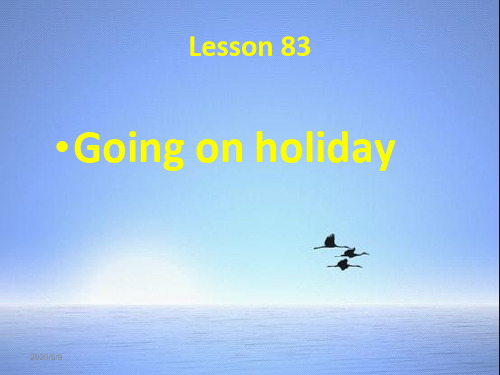
•Going on holiday
2019/6/16
2019/6/16
2019/6/16
Maldives
2019/6/16
Review
1.他在楼上; 2.他正在洗澡; 3.我马上就好了; 4.抽根烟; 5.来杯威士忌; 6.我们去了一家饭
• 1.He's upstairs. • 2.He's having a
bath. • 3.I'm nearly ready. • 4.Have a cigarette. • 5.Have a glass of
whisky then.
店;
• 6.We went to a
7.怎么了?出了什
restaurant.
么事?Βιβλιοθήκη • 7.What's the
matter?
2019/6/16
2019/6/16
• 5.当动词是leave, go, come, arrive等时,可 以用现在进行时表将来。
• We’re going to leave tomorrow. • = We’re leaving tomorrow.
• I’m coming. (有人叫你时) • He’s arriving tonight.
• pack it in [俚语] 放弃做某事
★leave v. 离开 leave sb. alone 让某人独自待会 leave for sp 动身去(某处) leave from sp= leave spn 离开某地
★already adv. (通常用于现在完成时,放在动词前)
1.我已经吃过早饭了。 I have already had my breakfast.
新概念英语第一册单词 第83课:度假

新概念英语第一册单词第83课:度假 mess [mes] 杂乱,凌乱【派生词】messy凌乱的【单词搭配】mess up弄乱 mess in干预【单词例句】A: Look at your room. What a mess!A:看看你的房间。
多么乱呀!B: Sorry, I'II clean it soon.B:对不起,我马上打扫。
pack [p?k] 打包,装箱【派生词】unpack打开包裹backpack双肩背包【单词搭配】pack in塞入 pack up收拾【单词例句】A: Why do you leave so early today?A:你今天为什么那么早就离开?B: Because I have to pack the luggage tonight.B:因为我今天晚上要打包行李。
suitcase ['su?tke?s] 手提箱【单词例句】A: Please help me with the suitcase.A:请帮我放一下这个行李箱。
B: Do you mind me putting it in the trunk?B:你介意我把它放到后备箱去吗?leave [li?v] v离开【单词扩充】depart离开 come off离开【单词搭配】leave for离开去某地 leave alone不理会【单词例句】A:I won't leave here until next Monday.A:找下周一才会离开这儿。
B: Would you like to visit places ofinterest here these days?B:这几天你要不要参观这儿的名胜古迹昵?already [??l'red?] adv已经。
新概念英语83课讲义

Lesson83 Going on holiday一、单词与短语mess:n.混乱,杂乱;关于mess常见的一个短语:in a mess:不整齐;在困境中;例:My desk is in a mess:我的书桌上乱七八糟;Let us go and help him, he is in a mess。
他在困境中,让我们去帮他吧。
Pack:v.包装、打包、装箱;例:We will go on holiday tomorrow and I am packing right now.明天就去度假了,我正在打包整理东西呢啊。
Suitcase:n.手提箱;leave:v.离开、动身;留下、剩下;关于leave的两个重要的短语:leave alone:让独自呆着,不管;leave behind:忘了带、、、遗留;例:leave us alone please:请不要管我们;I am sorry to let my books behind:糟糕,我忘记了带书。
already:adv.已经;already一般用于肯定句及疑问句中,是现在完成时的显著标志词。
例:Have you done it already?你已经做好了吗啊?Yes, I have done it already. 是的我已经做好了。
二、短语、句型及语法1、Do you want to have lunch with us?你想要跟我们一起吃饭吗?在本句中需要重点掌握:do you want to、、、句型。
这是英语中一个常见及应用甚广的句型:Do you want to play with us?你想要跟我们一起玩吗?Do you want to go with us?你想要跟我们一起去吗?2、Let′s go into the living room, carol.卡罗尔,我们到客厅里去吧。
在本句中需要重点掌握的一个知识点就是:let us 与Let′s两者在用法上的不同:Let′s虽然是let us 的缩写形式,但是两者用法具有本质的区别。
新概念第一册Lesson83-84
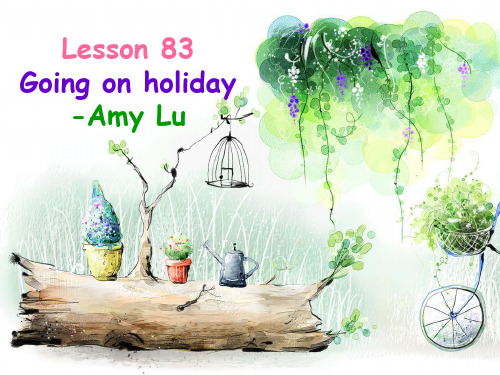
3) What are Carol and Tom going to do?
4) Where did Sam have his holiday?
CAROL: Hello, Sam. Come in.
TOM:Hi, Sam. We're having lunch. Do you want to have lunch with us?
TOM: Let's go into the living room, Carol.
We can have our coffee there.
22
CAROL:Excuse the mess, Sam. This room's very untidy. We're packing our suitcases. We're going to leave tomorrow. Tom and I are going to have a holiday.
What a mess! 真乱啊!
(2) v. 脏或乱的状态/把…弄乱 mess up 弄乱;弄糟
Don't mess up my clean floor. 别把我的干净地板弄脏了。
If you mess up you can try again. 如果陷入困境, 凌乱的,脏的
I have had lunch already. 我已经吃完午饭了。
I've already finished my homework. 我已经完成了作业。
2020/1/7
★ leave (left/left) [li:v]
新概念一册lesson83
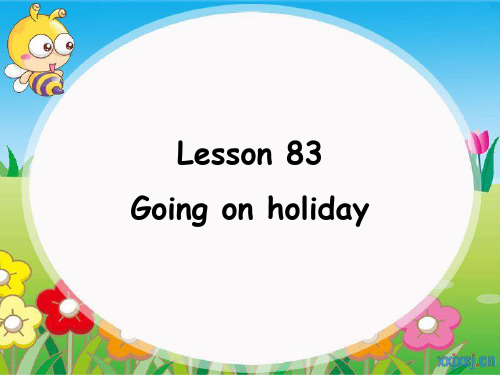
go 2. Let’s _____ (go) into the living-room. has had 3. Sam ______ just _______ (have) a cup of coffee. stayed 4. Where did you go? I __________ (stay) at home. 5. Lily was here yesterday morning, were but Ann and Bill __________ (be) not. 四、用still, yet, just, before, after, 填空 1. Tom feels a little better, but he is _______ in bed. still yet 2. You mustn’t get up _________. just 3. Five other cars were __________ behind him. snowed 4. It ______ the day before yesterday. after 5. Jill came home very late. She got home _____ a quarter past eleven at night.
suitcase
leave
already
Q1. Does Sam want to have lunch with Tom? Why? No,he doesn’t. Because he had lunch at half past twelve. Q2. When did Sam have a cup of coffee? He just had a cup of coffee after his lunch. Q3. What are Tom and Carol going to do? They are going to have a holiday.
新概念英语词汇第一册Lesson83:抱歉,这里很乱

新概念英语词汇第一册Lesson83:抱歉,这里很乱 1. messExcuse the mess, Sam.抱歉山姆,这里很乱。
Clean up this mess, Tom.把这乱七八糟的整理干净,汤姆。
The kitchen was an awful mess.厨房里整一烂摊子。
2. packWe're packing our suitcases.我们正在收拾行李箱。
Have you packed your things up?你的东西都打包好了吗?I forgot to pack my clothes.我忘记打包我的衣服了。
3. suitcaseHe packed all the things in his suitcase.他把所有的东西都打包进了行李箱。
Oh, my! The suitcase is really heavy.哦,天哪!这箱子真重!4. leaveWe're going to leave tomorrow.我们明天走。
The train leaves in ten minutes.火车十分钟后开。
They're leaving for London in the morning.他们早晨将出发去伦敦。
5. alreadyI've already had lunch.我已经吃过午饭了。
The film had already started when we got there.我们到那的时候电影已经开始了。
He's already arrived.他已经到了。
新概念英语第一册Lesson83-84

Have 词组大集锦
1 吃早饭 2 吃午饭 3 吃正餐 4 吃晚饭 5 吃一顿饭 6 度假 7 游泳 8 休息 9 高兴 10 抽一支烟 11 洗澡
Grammar
Grammar focus :
一般过去时:一般过去时表示过去某个 时间里发生的动作或状态;过去习惯性、 经常性的动作、行为
NCE
现在完成时:表示从过去某一事件发生到现 在或将继续持续下去,过去发生的事对现 在造成的影响
mess [mes] n. 杂乱,凌乱的状态
1. in a mess = at sixes and sevens 乱七八糟的(状态或局面) 你的房间乱七八糟的. is in a mess Your room ____________ 乱七八糟,请原谅。 Excuse the mess 清理散乱的东西 clear up the mess 2. What a mess ! 好乱啊!
我是5点钟吃的.
Would you like some coffee?
No, thank you. I have (just) had a cup. 我已经喝过一杯了.
<Ⅱ> They had some ice-creams
at 4 o’clock.
Would you like some ice-creams? No, thanks. I’ve had an ice-cream. I had an ice-cream at four o’clock.
公共汽车里挤满了人。
a packet of sweets 一包糖果
The bus was packed with people.
camera
ticket
money
credit card
新概念第一册 Lesson 83-84

E.g. Where have you been for the holiday?
参考译文
卡罗尔:你好,萨姆。进来吧。 汤 姆:你好,萨姆。我们正在吃午饭,你跟我们一起吃午饭好吗? 萨 姆:不,汤姆,谢谢。我已经吃过饭了。我在12点半吃的。 卡罗尔:那么喝杯咖啡吧。 萨 姆:我刚喝了一杯,谢谢。我是在饭后喝的。 汤 姆:我们到客厅里去吧,卡罗尔。我们可以在那里喝咖啡。 卡罗尔:屋子很乱,请原谅,萨姆。房间里乱七八糟。我们正收拾手提箱。
SAM: Aren’t you lucky! TOM: When are you going to
have a holiday, Sam? SAM: I don’t know.
I’ve already had my holiday this year. CAROL: Where did you go? SAM: I stayed at home!
SAM: No, thank you, Tom. I’ve _____________ lunch. I had lunch at half ____ twelve.
CAROL: Hello, Sam. Come in.
TOM: Hi, Sam. We’re having lunch. Do you want to have lunch with us?
SAM: No, thank you, Tom. I’ve already had lunch. I had lunch at half past twelve.
Grammar: 现在完成时✅ 现在完成时表示过去不确定的时间里发生的并与现在有着某种联系的动作;或开始 于过去并持续到现在的动作。构成:have/has + 动词的现在分词(done) 动词变过去分词: 1. 一般在词尾直接加“-ed ”,如:work-worked。 2. 以不发音的“e”结尾的动词,在词尾加“-d ”,如:live-lived。 3. 以“辅音字母+ y ”结尾的动词,把“y”变“i”,再加“-ed”。study-studied。 4. 以“重读闭音节”结尾,且末尾只有一个辅音字母(w、y、x除外),辅音字母前 只有一个元音字母,双写辅音字母,再加“-ed”。stop-stopped。 (重读闭音节是指以辅音音素结尾,元音发短元音,而且是重读音节的音节。) 5. 以c结尾的动词,要变c为ck,再加“-ed”, 如:picnic-picnicked。 6. 以及一些不规则变化动词,如:go-went, come-came, have/has-had, do/doesdone, be动词(am/is/are)-been, see-seen, put-put, read-read, let-let等
新概念英语 第一册Lesson 83

Lesson 83 –84Ⅰ. VOCABULARY1. pack1)打包,装箱We are going on holiday tomorrow and I am packing right now.2) 挤满,塞满The football fans packed the hall.3) package 包裹,包装2. mess n. 杂乱,(常常用单数)v.弄脏This room is a mess! You’ve made a mess of your job.in a mess 凌乱,肮脏You room is in a mess.3. leave 离开,剩下,留下It’s time for us to leave.ask for a leave 请假take French leave 擅自离开leave a place for another place 离开某地去某地The plane leaves Shenzhen for US.leave for a place 动身去……He will leave for Shanghai on business(出差).leave sb.sth alone 不要干涉某人某事Leave him alone.4. already 已经,用于肯定句,疑问句Have you done it already?yet 用于疑问句,否定句的句尾,含有“仍然”,“还没有”的意思。
Ⅱ.GRAMMER现在完成时:现在完成时是由“助动词have / has + 过去分词”构成的,其规则动词的过去分词构成与过去式相同 .1.表示过去发生或已经完成的某一动作或存在的状态对现在造成的影响或结果。
也就是说现在完成时虽与过去有关,但实际上看重的是对现在的影响或结果。
特点是动作不延续,因此,该时态只能与表示不定的过去时间状语(如:already,yet,before,recently等)、频度时间状语(如:never,ever,once等)、包括现在时刻在内的时间状语(如:this morning/month /year...,today等)连用。
新概念一L83-86单词讲义
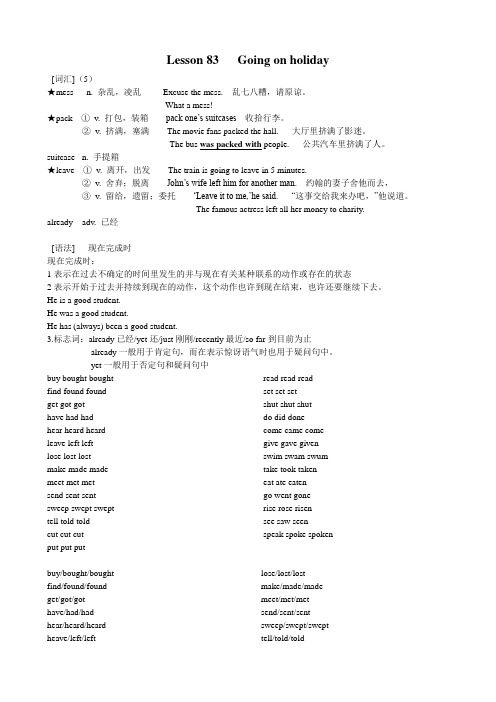
Lesson 83 Going on holiday[词汇](5)★mess n. 杂乱,凌乱Excuse the mess. 乱七八糟,请原谅。
What a mess!★pack ①v. 打包,装箱pack one‟s suitcases 收拾行李。
②v. 挤满,塞满The movie fans packed the hall. 大厅里挤满了影迷。
The bus was packed with people. 公共汽车里挤满了人。
suitcase n. 手提箱★leave ①v. 离开,出发The train is going to leave in 5 minutes.②v. 舍弃;脱离John‟s wife left him for another man.约翰的妻子舍他而去,③v. 留给,遗留;委托…Leave it to me,‟he said. “这事交给我来办吧,”他说道。
The famous actress left all her money to charity.already adv. 已经[语法] 现在完成时现在完成时:1 表示在过去不确定的时间里发生的并与现在有关某种联系的动作或存在的状态2 表示开始于过去并持续到现在的动作,这个动作也许到现在结束,也许还要继续下去。
He is a good student.He was a good student.He has (always) been a good student.3.标志词:already 已经/yet 还/just 刚刚/recently 最近/so far 到目前为止already 一般用于肯定句,而在表示惊讶语气时也用于疑问句中。
yet 一般用于否定句和疑问句中buy bought bought find found found get got gothave had had hear heard heard leave left leftlose lost lost make made made meet met met send sent sent sweep swept swept tell told toldcut cut cutput put put read read readset set setshut shut shutdo did donecome came come give gave given swim swam swum take took takeneat ate eatengo went gonerise rose risensee saw seen speak spoke spokenbuy/bought/bought find/found/found get/got/gothave/had/had hear/heard/heard heave/left/left lose/lost/lost make/made/made meet/met/met send/sent/sent sweep/swept/swept tell/told/told【listen to the tape(or the question)】Where is Sam now? He is in Tom's home.What are Carol and Tom doing now? They are having lunch.Has Sam had lunch? When did he have lunch? Half past 12.What did Tom ask Sam to do? To have lunch with them.What did Carol ask Sam to do? To drink a cup of coffee.Did Sam want to have a cup of coffee? No.Why? Because he has already had a cup. When did he have? After lunch.Is Carol's living room very tidy? No.Why is it untidy? Because they are packing their suitcases. Why are they packing their suitcases? They are going to have a holiday.Has Sam had his holiday yet? What did Sam say? He has already had his holiday.Where did he go? He stayed at home.Sam is a lucky man. Is that right? Yes.【monologue】Sam is in Carol's living room.Carol and Tom are having lunch.want sb. to do sth.Tom wants Sam to have lunch with them.Sam says that he has already had lunch.He had lunch at half past 12.Carol wants Sam to have a cup of coffee, but Sam says that he has already had a cup.He says that he had a cup after lunch.Let's go into the living room.We can have coffee there.This room is very untidy.Excuse the mess.We are packing our suitcases.We're going to have a holiday.We're going to leave tomorrow.Sam has already had his holiday, but he stayed at home.补充材料dream-boat 理想中的人或事物Romeo/Juliet 罗密欧与朱丽叶,热恋中的人brown-nose 谄媚的人拍马的人sell like hot cakes 热销Let sleeping dogs lie. 别惹麻烦It is never too late to learn. 活到老,学到老。
新概念一册L83-84

• • • • •
(3)现在完成时通常与表示不确定的时间副 词或短语连用如: ever 曾经 never从不 already已经 yet 还 just刚刚 for+一段时间 since+时间点 since+2006自从2006年起、 since +时间段+ago since two years ago
Review
Rew words
★ mess [mes] n.杂乱,凌乱 ★ pack [pæ k] v.打包,装箱 ★ suitcase ['sju:tkeis] n.手提箱 ★ leave(left/left) [li:v] v.离开 ★ already [ɔ:l'redi] adv.已经
★ mess
(1) n.杂乱,凌乱 in a mess = at sixes and sevens 乱七八糟的状态或局面
What a mess! 真乱啊!
[mes]
n.杂乱,凌乱
(2) v. 脏或乱的状态/把…弄乱 mess up 弄乱;弄糟
Don‘t mess up my clean floor.
If you mess up you can try again. 如果陷入困境,你可以再次尝试。
CAROL:Have a cup of coffee
then.
SAM:I've just had a cup, thank you. I had one after my lunch. TOM: Let's go into the living room, Carol. We can have our coffee there.
Don' t forget to pack the mirror! 别忘了把镜子装起来! We began to pack them into a suitcase. 我们现在开始把它们装到手提箱里。
新概念英语1-Lesson83-84
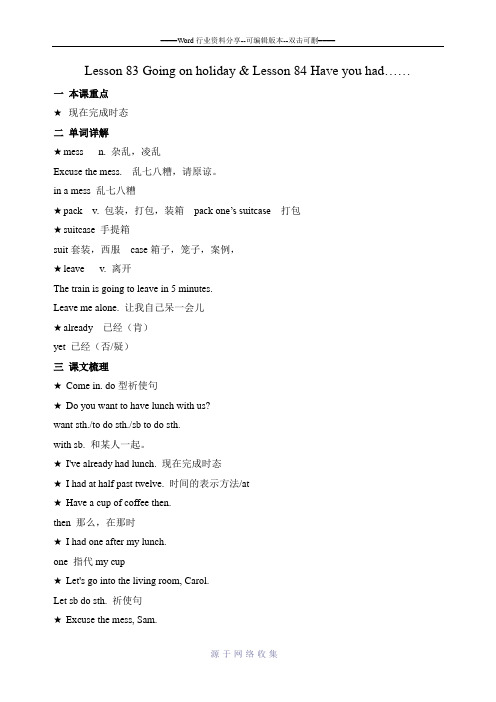
Lesson 83 Going on holiday & Lesson 84 Have you had……一本课重点★现在完成时态二单词详解★mess n. 杂乱,凌乱Excuse the mess. 乱七八糟,请原谅。
in a mess 乱七八糟★pack v. 包装,打包,装箱pack one’s suitcase 打包★suitcase 手提箱suit套装,西服case箱子,笼子,案例,★leave v. 离开The train is going to leave in 5 minutes.Leave me alone. 让我自己呆一会儿★already 已经(肯)yet 已经(否/疑)三课文梳理★ Come in. do型祈使句★ Do you want to have lunch with us?want sth./to do sth./sb to do sth.with sb. 和某人一起。
★ I've already had lunch. 现在完成时态★ I had at half past twelve. 时间的表示方法/at★ Have a cup of coffee then.then 那么,在那时★ I had one after my lunch.one 指代my cup★ Let's go into the living room, Carol.Let sb do sth. 祈使句★ Excuse the mess, Sam.Excuse me. 请原谅…★We’re going to leave tomorrow. = We’re leaving tomorrow.当动词是leave, go, come, arrive等时,可以用现在进行时表将来。
★Tom and I are going to have a holiday.人称代词排序be going to do sth. 一般将来时(表示计划、打算做某事)。
新概念课堂笔记 第一册 Lesson 83-84
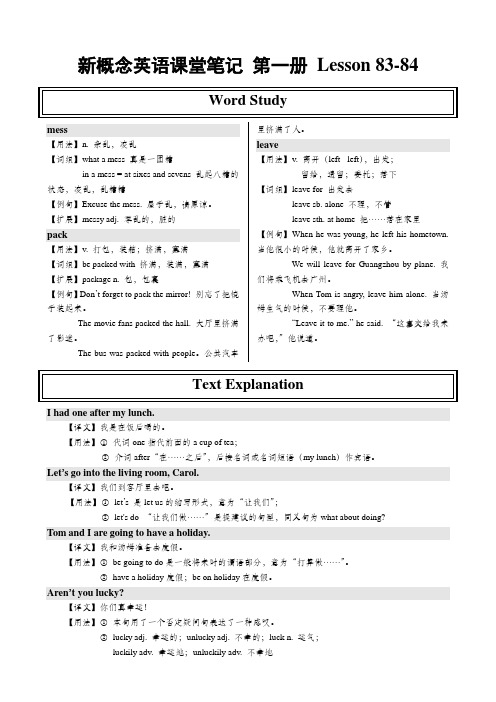
新概念英语课堂笔记第一册Lesson 83-84mess【用法】n. 杂乱,凌乱【词组】what a mess 真是一团糟in a mess = at sixes and sevens 乱起八糟的状态,凌乱,乱糟糟【例句】Excuse the mess. 屋子乱,请原谅。
【扩展】messy adj. 零乱的,脏的pack【用法】v. 打包,装箱;挤满,塞满【词组】be packed with 挤满,装满,塞满【扩展】package n. 包,包裹【例句】Don’t forget to pack the mirror! 别忘了把镜子装起来。
The movie fans packed the hall. 大厅里挤满了影迷。
The bus was packed with people。
公共汽车里挤满了人。
leave【用法】v. 离开(left - left),出发;留给,遗留;委托;落下【词组】leave for 出发去leave sb. alone 不理,不管leave sth. at home 把……落在家里【例句】When he was young, he left his hometown. 当他很小的时候,他就离开了家乡。
We will leave for Guangzhou by plane. 我们将乘飞机去广州。
When Tom is angry, leave him alone. 当汤姆生气的时候,不要理他。
“Leave it to me.” he said. “这事交给我来办吧,”他说道。
I had one after my lunch.【译文】我是在饭后喝的。
【用法】○1代词one指代前面的a cup of tea;○2介词after“在……之后”,后接名词或名词短语(my lunch)作宾语。
Let’s go into the living room, Carol.【译文】我们到客厅里去吧。
新概念第一册Lesson_83-84笔记

Lesson 83-84 Going on holiday 度假一、词汇--mess--1) n. 杂乱或乱的状态(通常用单数)--This kitchen’s a mess! 厨房杂乱无章。
--You’ve made a mess of the job. 你把工作搞得一团糟。
--Get cleaned up! You two are a mess! 收拾一下吧!你们俩可真邋遢!2)v. 弄脏,弄乱--Don’t mess my hair. 别弄乱我的头发。
--messy adj. 凌乱的 a messy room--pack v. 包装,打包,装箱--All these books need to be packed into the boxes.所有这些书都需要打包到那些箱子里。
--suitcase n. 手提箱--pack the suitcase 整理行囊--leave1) v. 离开--It’s time for us to leave.--It’s time for sb to do…某人该做某事的时间到了。
--leave a place for another place--离开….动身去….--The plane leaves Guangzhou for Shanghai at 12:35.--飞机于12时35分自广州飞往上海2)让某事(某物)处于某种状态(leave +adj.)--leave the door open, please.3)忘带某物--I left my umbrella on the bus.4) n. 假期--sick leave 病假--already adv. 己经(时间副词)--The teacher was already in the classroom when I arrived. 当我到达的时候,老师己经在教室里了。
--She had already left when I phoned. 我打电话时她早走了。
